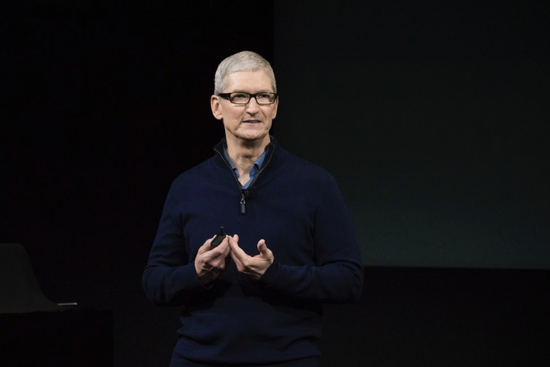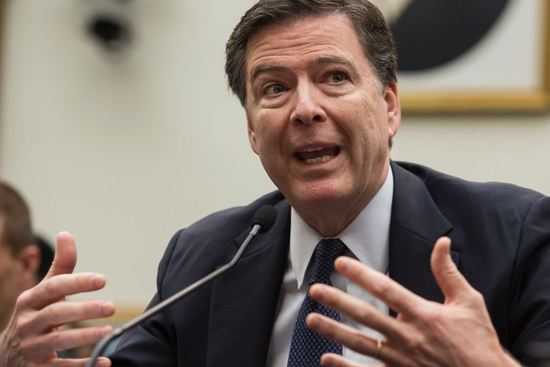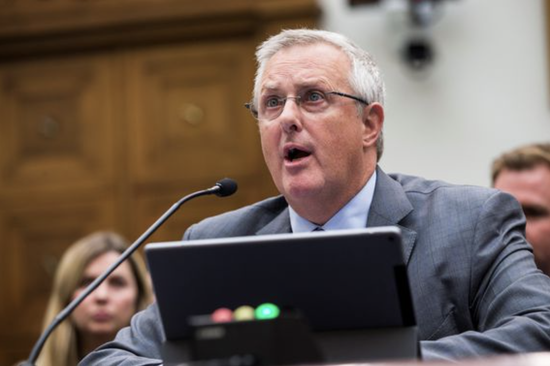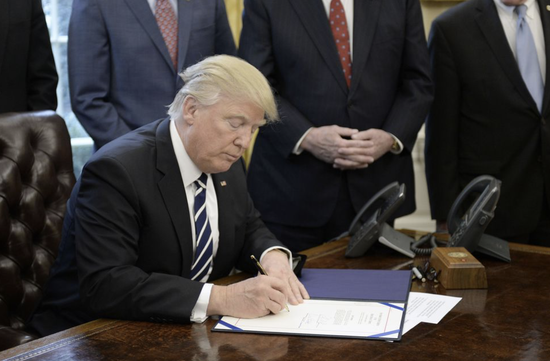
(Apple CEO Cook rejected FBI requirements for backdoor software and assistance in cracking suspect iPhones last year. Figure/James Martin/CNET)
February 16 News According to foreign media (CNET), it has been one year since the "Apple FBI" last year. Both sides of the incident have not rekindled the issue. It seems that everything is stable. However, it is not.
In early 2016, the FBI tried to force Apple to help unlock a terrorist iPhone, triggering a legal battle between "security" and "privacy." On the other side of the battle is a giant technology company that takes responsibility for guarding user privacy and is always on the lookout for a surveillance system similar to that described by Orwell's "1984". (The irony is that this book became a bestseller again after Trump came to power.) Apple’s opponent is the most powerful government in the world, claiming that if it fails to gain important intelligence, it will face the threat of terrorist attacks.
Network security experts said that this debate will have a profound impact on many areas - from private photos to how technology companies operate in other countries.
Just as the two sides did not allow each other to prepare for the public knowledge, things ended in an unexpected way: The FBI suddenly said that it no longer needed the assistance of Apple, and the whole matter ended.
As the war has not risen to court, we have not been able to get the answer of “security†and “privacy†which should be given priority. The result of this controversy is still in the fog after the events of the past year. If something similar happens again, one can imagine that the debate will resume.
William Snyder, assistant professor of law at Syracuse University School of Law, said: “Last year we missed an opportunity.... The problem is whether you choose to deal with it in a quiet period or wait until you have to pay a high price. â€
The FBI led CNET to the comments of the Federal Director of Investigation, James Comey, in April of last year. Komi talked about how the United States always balances privacy and public safety, and how encryption technology undermines this balance. "The strong encryption logic means that everyone's life, including law enforcement, will soon be affected by strong encryption," he said. "In my opinion, according to our history and our values, absolute privacy and those who think that the government should take hands off the people's mobile phone does not make any sense."
At the same time, Apple CEO Tim Cook continued strong encryption technology and Apple’s efforts to protect user data. Last week at the University of Glasgow in Scotland, Cook said: “We are not radicals, but we are asked to do something we know erroneously. So we made a choice between blind submission and resistance. We chose to resist and fight. â€
Past review
Let's do a quick review: In early 2016, the FBI hopes that Apple will develop software to unlock a suspect’s iPhone. Syed Farook’s terrorist attack in San Bernardino, California, a few weeks ago killed 14 people.
Apple helped the FBI extract data from the suspect iCloud account, but some data is still not available. Because the mobile phone password is unknown, the FBI cannot open the phone.

(On March 1st, 2016, FBI Director James Komye testified at the Judicial Committee hearing of the U.S. House of Representatives. Figure/Getty Images)
On February 16, 2016, U.S. magistrate Sheri Pym ordered Apple to develop backdoor software for the FBI. The order was rejected by Apple. Cooke believes that this order will threaten the safety of all iPhone users. Bypassing the iPhone password means creating a backdoor in its iOS system, and it can also be used to snoop on all the other iPhones.
In the next few weeks both parties argued over legal documents and public comments. The battle ended on March 21, the day before the original court hearing. The FBI found a third party agency to help unlock the phone. The facts show that the government does not need Apple's help at all.
Another case occurred in Brooklyn, New York, ending in a similar way. After finding a way for third parties to unlock the iPhone, the FBI abandoned its appeal for help from Apple.
In both cases, the FBI initially thought that only Apple could help unlock the iPhone. But without exception, the FBI has found alternative solutions at the last minute of the matter. The government did not point out specifically which organization helped to unlock the iPhone, but it was later reported that the Israeli security company Cellebrite was a so-called mystery helper. Earlier this year Cellebrite was hacked and 900G data leaked. This matter really made Apple scared.
Encryption debate
The focus of the debate is the encryption technology used on Farouk's iPhone 5C. This technology scrambles the content of data and requires a password to access it. Even if the investigator copies the entire data, the data remains encrypted. If the investigator forces the wrong password 10 times, the data on the iPhone will be erased.
Apple and privacy advocates insist that encryption is critical to ensuring the security of personal information and communications. However, government and law enforcement officials are opposed to encryption and believe that it will hinder their ability to investigate crimes and terrorist activities.
The privacy battle between Apple and the FBI has made encryption a topic of concern to ordinary consumers up to Congress. The debate also prompted other organizations to take action. Facebook’s messaging application, WhatsApp, launched end-to-end encryption in April, which means that even Facebook can’t view these messages, eliminating the risk of it being forced to sell its privacy to the government.
At the same time, Apple's fight with the FBI did not stop. Senate intelligence committee’s bipartisan leaders Richard Burr and Dianne Feinstein both expressed support for legislation on encryption. There are reports that Burr has prepared a proposal to impose criminal penalties on companies that do not cooperate with government investigations. The bill will authorize federal judges to order tech companies like Apple to help law enforcement officials access encrypted data. It is Apple's objection to establish a back door in the product.
"The consensus among security, privacy, and legal experts is that this is a terrible idea," said Larry Downes, director of the Center for Business and Public Policy at Georgetown University McDonough School of Business.
"This means the end of privacy protection."
In late May, the bill did not go into the Senate to vote. No other encryption laws have been proposed since then. According to Mozilla, a developer of Firefox browsers, as of January this year, more than half of Internet traffic is now encrypted.

(Bruce Sewell, Apple's general counsel, said at the House Judiciary Committee hearing on March 1 that Apple refused to help the FBI unlock the iPhone 5C.)
Where do you go from here?
Although Apple failed to fight to court, some of its industry partners had the opportunity to affirm their position in court.
Both Microsoft and Google face similar legal disputes, with law enforcement requiring access to data stored in their cloud services. Amazon was also asked to provide Echo recordings related to the Arkansas murder case. Microsoft, which has a large data center in Ireland, said in court that it will not provide data to the United States government for preservation in Ireland unless it is approved by the Irish authorities. In comparison, Google is more unfortunate: Earlier this month, an American judge ruled that Google must provide FBI with e-mail data stored outside the United States.
Slightly different from the Apple case, Microsoft and Google store information in the cloud without encryption. The U.S. government hopes to circumvent the limitations of the Stored Electronic Communications Act, which may have more problems in the future.
At the same time, Apple continues to strengthen the security of its equipment. In August, for the first time, Apple imitated the peer vulnerabilities and rewards program, and the bonus was as high as 200,000 US dollars. The plan encourages external researchers to identify and report loopholes in their software products to help improve the product. Previously, Apple conducted internal vulnerability screening.
Trump brings a tougher position
During the US presidential election, Apple, like many Silicon Valley companies, was a Hillary supporter. The arrival of Trump brought more changes to the situation. In strengthening law enforcement, the new president may take a tougher position than Obama.
Charley Moore, chief executive of online law firm Rocket Lawyer, believes that the new government will go a step further in data collection and may even force private companies to share private information with the government.
The White House did not respond to requests for comment.
During the election campaign, Trump repeatedly criticized Apple for failing to cooperate with the government investigation. "They (the apple) think he is?" He said that time. On another occasion, Trump even urged the people to boycott Apple products until the latter compromised to help unlock the device. Only this did not actually happen.

(On encryption issues, Trump may take a tougher position than Obama. Figure/Getty Image)
Some early decrees after Trump took office have already made the tech community very unhappy. The restrictions on entry to Muslim countries have caused strong protests from Apple, Microsoft and dozens of other companies. Ajit Pai, the head of the Federal Communications Commission appointed by Trump, is also likely to abolish the principle of network neutrality. This principle is favored by most technology companies.
Trump also announced its withdrawal from the Trans-Pacific Partnership Agreement (TPP). There are provisions in the agreement to protect the member company companies from having to provide the software source code as a condition for entering another country's market. This is consistent with Apple’s position in protecting privacy. However, after the United States withdrew from the TPP, this protection clause no longer applies to US companies.
During the election campaign, Trump took Hilary as Secretary of State and used a private server to deal with confidential emails. Trump had planned to sign an executive order on cybersecurity in late January, but eventually canceled the signing without explanation.
With Trump taking over the White House and Congress being held by Republicans, cybersecurity experts expect that encryption and privacy-related policies will soon change, except that it is not like the Patriot Act after 911. As a response to a disaster after an attack. After the Sept. 11 terrorist attacks in 2001, the Bush administration signed the "Patriot Act." The act intensified the monitoring power of administrative forces and caused controversy over violations of the privacy of the people.
"After a catastrophic attack, the focus is on national security," said Daniel Rosenthal, a former National Security Council counterterrorism officer. If the United States is attacked again, then it will be a good opportunity to adjust the policy inclination and alienate privacy and data security.
TOYOTA Fuel Filter
TOYOTA Fuel Filter
Zhoushan Shenying Filter Manufacture Co., Ltd. , https://www.renkenfilter.com
